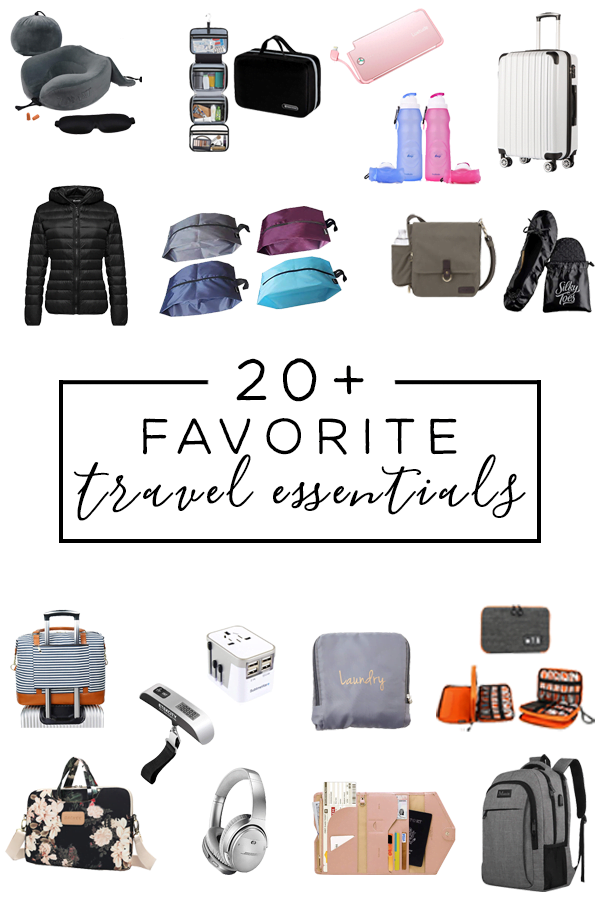Being able to travel around the world is often a dream come true, leading you to places you never even imagined. Whether you’re a first-time traveler or a seasoned adventurer, it’s important to pack properly. You might find it unimportant now, but nothing’s worse than finding yourself in the middle of a country whose language you don’t speak and realizing you forgot something essential.
A travel-packing list can be one of your best friends during the days leading up to your trip. These travel essentials could help you much on your trip somewhere off the road.
Traveler’s Essentials:

Passport: The first item on your list of essentials is your passport because it’s the one thing that can’t be replaced without a lot of effort – and you won’t be able to leave the country without it. Some countries also require that tourists carry their passports with them at all times, but often this is not strictly enforced. The best option is to carry a photocopy of your passport with you when you are out and about and leave your passport in the hotel safe. Having a photocopy with you is also helpful should you ever have your passport stolen and you have to apply at an overseas embassy for a replacement.
Plane ticket or boarding pass: Now that we have the internet, checking-in can be as simple as showing an e-mail to someone at the counter. Just don’t delete the email containing the relevant information in case you need to print out your ticket again before your return journey.
Debit/credit card: For anything you need to buy or pay for that hasn’t already been prepaid. You can also use credit cards to withdraw cash advances at ATMs should you need cash for purchases in places that don’t accept credit cards. Note that credit cards are more reliable when traveling overseas. Sometimes travelers report problems using debit cards overseas despite having used them with no issues in their home countries.
Cash: Bring about $500 more or less to pay for visas and other items where you can’t use your credit card. Some people like to carry more cash rather than rely on their credit cards, but here you need to weigh up the convenience of having cash against the risk of losing the money if you are going some place where you might be pickpocketed. Bear in mind too that most countries have restrictions on carrying more than $10,000 in cash through customs. This is a travel must-have. [hoops name=”InArticle”]
Medicine: If you take prescription medication, it’s important not to leave it behind. Many countries require you to bring your doctor’s prescription as well, as proof that you are carrying the medication legally. It’s not often that Customs ask to see the prescriptions, but it’s better to be safe than sorry. Always pack prescription medicines in your carry-on bag and never in your checked luggage.
Spare glasses or contacts: Depending on how forgetful you are or how often you use eyeglasses, you might get to leave your glasses on a counter, table, or somewhere where you might never see them again. It’s a good idea to keep spares in your carry-on bag should you lose them whilst overseas. That way you avoid the cost and inconvenience of buying replacements when you should be traveling.
Reliable luggage: For everything else, you will need some reliable luggage to pack your clothes and other personal possessions. For a long trip, it’s advisable to invest in new luggage so it won’t fail halfway through and leave you having to buy replacements at prices you might not be able to afford in an expensive city. Check out retailers like Luggage Direct who put their catalogs online, so you can check out what is available at every price point before you set foot in a luggage shop. Or if you know exactly what you want, you can order online and have it delivered to your home to save time.
Clothes:

Outfits: To ease the burden of choosing outfits, choose tops and bottoms that you can easily mix and match. This applies to both men and women. That way, you can re-wear certain shirts if they haven’t been worn for long and you won’t have to wash entire outfits in order to use them again. Keep your destination activities in mind too. For women, if you are planning on going hiking or adventuring, you won’t need a lot of long dresses and skirts. Here’s a list of clothes that you should consider packing:
-lightweight clothing that can easily be layered
-long-sleeved shirts for sun protection
-thermal underwear if going to a cold climate
-sweaters or jackets
-t-shirts, tank tops
-pants and shorts
-belt(s)
-socks
-comfortable shoes
-pajamas and sleepwear
-rain jacket or portable umbrella
Underwear: Do not forget your underwear. If you are going to be staying in one place, then you won’t need to bring a lot because underwear is easy to wash out in the bathroom and dry overnight. But if you are going to be on the move all the time, you may need more than you think. Underwear does not take up a lot of space in your bag, so it can be used to fill in the gaps when everything else has been packed.
If you want to bring along some jewelry, feel free to! Just be careful of wearing showy jewelry in poorer areas, because it can draw attention to yourself and may entice someone to try to steal your belongings.
For women
If you are expecting a baby, make sure you carry a noodle pillow for pregnant women for your
comfort.
Toiletries:

Toothbrush, toothpaste, and floss: Don’t get out of the shower and get ready for a relaxing night in bed only to realize you’ve forgotten your toothbrush! Many hotels do provide complimentary toothbrushes and toothpaste, but these are disposable types and not good quality, so it is best not to rely on them.
Shampoo and conditioner: Some people like to bring two separate bottles, but if you want to save space, you could try using a shampoo-and-conditioner for the time you are away. It’s not as effective but more convenient.
Deodorant: You can’t take aerosol sprays in your hand luggage, so keep that in mind when you pack. The roll-on or stick types are a better option when you are traveling internationally.
Sunscreen: The sun is a deadly laser. So don’t forget the sunscreen if you are traveling to warm climates because it will not only help to prevent you getting sunburnt, it can help minimize the risk of skin conditions in the future. [hoops name=”InArticle“]
Insect repellant: This is especially important if you’re traveling to hot, humid climates where mosquitoes are prevalent. Malaria and dengue fever are potentially deadly diseases that can be easily contracted in many parts of the tropics if bitten by mosquitoes, so this is a very important item on your packing list.
Medical kit: A compact medical kit can be a lifesaver. If you don’t want to go through the trouble of packing your own, many convenience stores offer ready-made travel medical kits with handy carrying cases. If you’re allergy-prone, adding some antihistamines can be a good idea.
For women: Don’t forget the makeup for the nights you want to go out or just for your daily routine. And also sanitary pads/tampons – these are available in most convenience stores around the world, but you may have a specific brand you prefer.
Gadgets:

Smartphone: Of course! Your phone is your lifeline to the outside world. If you get in trouble, you’ll likely turn immediately to your phone to search and call for help and update your loved ones. A smartphone with a data roaming plan enables you to track where you are at all times and also search for information like transport timetables and nearby restaurants.
Camera: If you love documenting your travels as much as you love actually traveling, then you’re going to need a good camera. Some high-end smartphones can take photographs almost as good as digital cameras these days, but if you are using your phone for both, you may find yourself frequently running out of battery power. Check this article for an underwater camera – Supremo 4K.
Laptop: If you’re blogging or working on assignments when you’re away, then you’re going to need your laptop or a tablet. As this may be the most valuable item you’ll be carrying, consider packing a laptop lock as well so that you can keep it secured when you have to leave it in your hotel room.
Headphones: To listen to music or make phone calls. Long flights can be boring, especially if you are on a budget airline that doesn’t offer movies to watch. So a good pair of headphones is a worthwhile investment. They also help when making phone calls from a noisy location. [hoops name=”InArticle”]
USB stick: To unload camera photos and free up space. Also, bring a small power pack to recharge your batteries when you don’t have access to mains power. There are some good ones on the market these days, which are hardly any bigger than a USB stick, and prices have come down a lot in recent years.
Chargers and spare cables: Chargers are the most common item that is left behind in hotel rooms or hostels. By carrying a spare charger and cable, you can prevent the risk of this happening and your phone dying in the middle of nowhere. Don’t forget to bring a separate outlet adaptor for your computer because there are likely to be many occasions when you will be using your laptop and charging your phone at the same time.
You may or may not bring some of the items stated in here but always make sure that your passports, cash, atm cards, and other valuable gadgets and accessories are always with you. Happy travels!
Recommended Reads
L.A. Tower Hotel, Bangkok Review: Value for Money and Comfort
Jobs That Let You Travel The World
From Hiking Solo to Getting Engaged: The Love that Sparked from the Mountains
8 Reasons Why Traveling Solo is Life Changing!










Comments are closed.